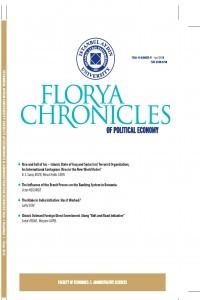AN ASSESMENT OF THE BOKO HARAM INSURGENCY IN NIGERIA
AN ASSESMENT OF THE BOKO HARAM INSURGENCY IN NIGERIA
Boko Haram, Nigeria, Chad, Cameroon, Niger, terrorism, religious cleavages, socioeconomic and political grievance, poverty, unemployment, income inequality, oppression police force brutality,
___
- [1] Max, A., “What Terrorist Really Want, Terrorist Motives and Counterterrorism Strategy”, International Security 32(4), 2008 [2] Adenrele Adetoro R., “Boko Haram Insurgency in Nigeria as a Symptom of Poverty and Political Alienation”, Journal of Humanities and Social Science 3(5), 2012 [3] Ahokegh A.F., “Boko Haram: a 21st Century Challenge in Nigeria”, European Scientific Journal 8(21), 2012 [4] jayi A.I., “Boko Haram and Terrorism in Nigeria: Exploratory and Explanatory Notes”, Global Advanced Research Journal of History 1(5), 2012 [5] BBC African Service, “Who Are Nigeria’s Boko Haram Islamists?”, January 11th, 2012 [6] Cliteur Paul B., “Religion and Violence or the Reluctance to Study this Relationship”, Forum Philosophicum 15, 2010. [7] Jacob Zenn, Making sense of Boko Haram’s different factions: Who, how and why? 2016. [8] Nelson Todd D. (ed.), “Handbook of Prejudice, Stereotyping, and Discrimination”, New York: Psychology Press, 2009 [9] Ojo Emmanuel O., “Boko Haram: Nigeria’s Extra-judicial State”, Journal of Sustainable Development in Africa 12(2), 2012 [10] Shaka Jack, “Inside the Labyrinth: Nigeria’s Unending Conflict. An Interview with Dr Sadeeque Abubakar Abba”, Journal of Conflictology 2(2), 2011 [11] Thomson Valarie, “Boko Haram and Islamic Fundamentalism in Nigeria”, Global Security Studies 3(3), 2012 [12] Waldek Lise, Jayasekara Shankara, “Boko Haram: the Evolution of Islamist Extremism in Nigeria”, Journal of Policing, Intelligence and Counter Terrorism 6 (2), 2011
- ISSN: 2149-5750
- Yayın Aralığı: Yılda 2 Sayı
- Başlangıç: 2015
- Yayıncı: İstanbul Aydın Üniversitesi
Female Inclusion and Economic Development: The Case of Cameroon
Ahmet Sedat AYBAR, Michele Patricia POUGNI SIATOU
Aysu INSEL, Abdurrahman KORKMAZ
AN ASSESMENT OF THE BOKO HARAM INSURGENCY IN NIGERIA
Discerning the Determinants of Common Stock Valuation: An Empirical Analysis
